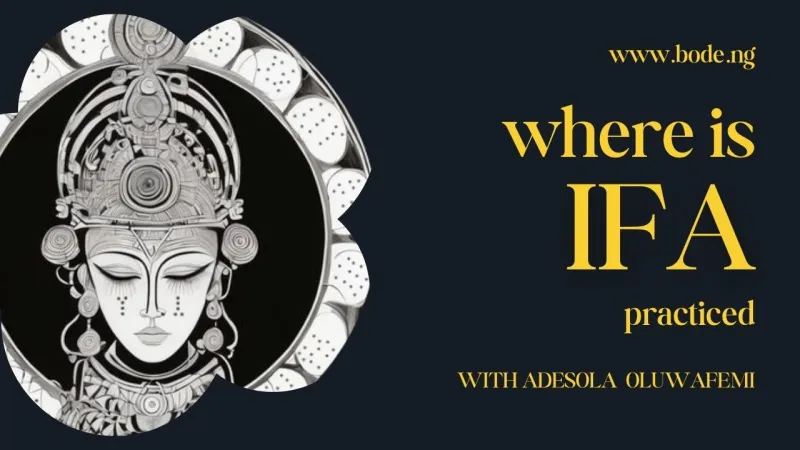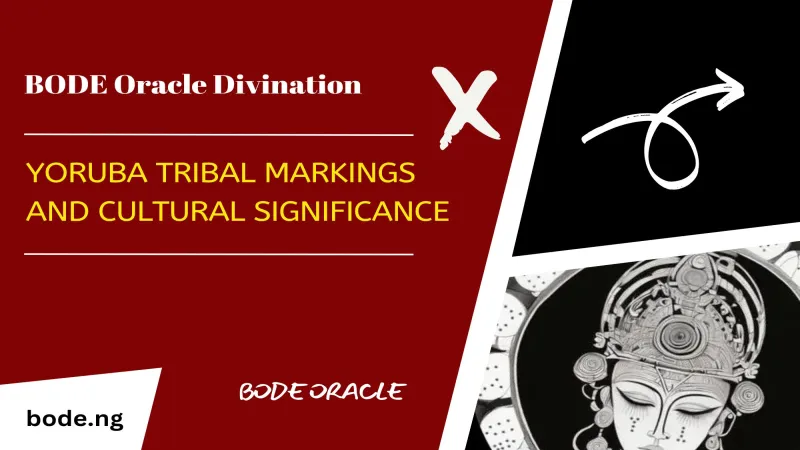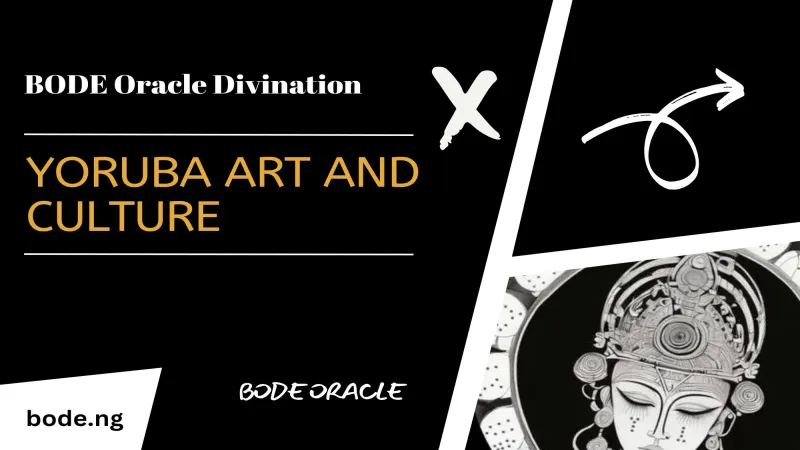The Ifa is a divination system that originates from Yorubaland in West Africa. While it primarily belongs to the traditional religion of the Yoruba people, it is also practiced by small communities in other West African regions, the Canary Islands, and certain parts of the Americas.
The Ifa tradition has influenced a variety of cultures, spiritual practices, and belief systems, including Umbanda, Vodou, Palo, and Santeria.
Ifa, like many other ancient beliefs, has a rich history of folktales, myths, and legends that are inextricably linked to the Yoruba cultural legacy. One generally held myth is that the Ifa oracle was established by Orunmila, the grand priest.
According to Yoruba culture, the supreme creator brought Orunmila to Earth to establish order and give divine rules.
He is believed to have created the first Ifa center in Ile-Ife, which is considered the Yoruba people's birthplace. The first Ifa initiates were Akoda and Aseda, Orunmila's early disciples. (Iba Akoda, Iba Aseda).
What does Ifa mean? Learn more about Ifa spirituality and divination here.
How is The Ifa Divination System Structured?
Ifa is a spiritual and divination system rooted in the belief in three key elements: the supreme being, Olodumare; the spirits, known as Orisa; and the Ancestors.
Olodumare, regarded as the highest deity, is also referred to by various other names such as Eleda, Eledumare, and Olorun.
Olodumare
In Ifa, Olodumare is regarded as the only supreme God. The term Olodumare is derived from the phrase "O ní ô dù mà rè," which means "the one who owns all creation so that it does not become empty."
The Yoruba believe that Olodumare surpasses gender and is mainly uninvolved in human affairs on Earth. According to Ifa, Olodumare created a universe that contains everything humans require for pleasure and contentment.
According to the Ifa creation story, Olodumare created the universe, organized the night and day cycles, and determined human destiny.
When people face misfortune, the Yoruba may declare they are "under the lashes of Olodumare." It is also believed that Olodumare introduced death after humans requested relief from the hardships of aging and frailty.
Orisa/Orisha
In the Ifa belief system, every natural element and living being is sustained by an inner force that connects them to their source.
This encompasses all aspects of nature, from the wind, thunder, and storms to rivers, rocks, plants, animals, and humans. These natural forces, which sustain and govern the universe, are known as Orisa (or Orisha).
Each Orisa is assigned specific responsibilities. It is said that humans are in constant interaction with these natural forces, whether consciously aware of them or not.
The Orisa also act as intermediaries between humans and Olodumare, serving as a link between the supreme being and the earthly realm.
Here is a look at the most common Orisas:
Esu
In Ifa, there are 201 powers aligned with the right side, known as Iborra or Irumole, representing the Orisa, and 201 powers on the left side, called Ajogun, representing demonic forces.
The Orisa protect and support human well-being, while the Ajogun bring challenges and obstacles. Esu holds a unique place in this structure, as he exists on both sides—being both an Ajogun and an Orisa simultaneously.
Esu leads the demons and commands the eight agents of mischief in Ifa: Iku (death), Arun (sickness), Egba (paralysis), Epe (curse), Ewon (imprisonment), Oran (great trouble), Ofo (great loss), and Ese (other problems).
Esu's dual nature of being both good and bad makes him both loved and feared. During sacrifices in Ifa, offerings are typically presented to Esu before any other Orisa.
Ogun
Ogun, known as the god of iron, is closely linked to sacrifice in Ifa. Though Esu traditionally receives the first offering, Ogun is the one who first feels the blood of the sacrifice due to his control over the knife.
Ogun symbolizes the life force of the sacrificial being and is believed to clear obstacles, making spiritual growth easier for humans.
He represents the vital force that sustains all life in creation. Yoruba belief suggests that Ogun vowed to never sleep as long as the world keeps turning. When one half of the world rests, he is busy with the other half that is awake.
Ọ̀ṣọ́ọ̀sì or Oshosi
Ọ̀ṣọ́ọ̀sì is the Orisa responsible for guiding humans toward the most direct path to their spiritual goals. His primary role is to assist people in developing good character through an intricate spiritual journey called 'Iwa-kiri.'
Ọ̀ṣọ́ọ̀sì which is also known as Oshosi in the Americas is also connected to hunting, forests, wildlife, and prosperity. As the provider of sustenance, he is honored as the spirit of meals, symbolizing his role in supplying food.
Known for his agility, sharp intellect, and wisdom, Ọ̀ṣọ́ọ̀sì embodies the art of hunting with skill and strategy. He is also the Orisha of contemplation, with a deep appreciation for the arts and beauty.
Ọ̀ṣọ́ọ̀sì wields a bow and arrow (called "ofá") as he seeks out positive influences and beneficial energies. In rituals dedicated to Ọ̀ṣ́ọ̀sì, sacrifices typically include goat, cooked pig, and guinea fowl. His traditional Yoruba greeting is "Èku, aro."
Physical evolution and spiritual growth are said to be intertwined, meaning Ọ̀ṣọ́ọ̀sì or Oshosi helps balance human development with the protection and growth of nature.
Iyemoja or Yemọja
Iyemoja which is also called Yemọja in South America and Brazil is one of the most powerful female Orisa, presiding over the rivers, seas and oceans. She is responsible for the motion of the waves, moving them from left to right.
Yemja dresses in various colors, such as pink, white, blue, and green. When her followers fall ill or they are seeking for her help, they bring baskets of fruits and offerings to the river side or the ocean, calling her name and throwing this offerings into the river or the sea to seek her aid.
Aganju or Agayu Sola in Spanish
Aganju is believed to have been born at the center of the earth, giving him control over the planet and a wide-reaching perspective. He governs mountains, rivers, and other high places on earth.
Aganju holds a strong connection to Sango in Yoruba tradition. In some accounts, Aganju is considered Sango's father, while in others, he is viewed as Sango’s brother. Both Aganju and Sango were once rulers of the Oyo Empire who were later deified.
In Yoruba religion, particularly in parts of Nigeria and the Republic of Benin, Aganju is revered as a warrior king from the town of Shaki, located in present-day Oyo State, Nigeria.
Known for wielding a sword, Aganju is said to fight by unleashing fire, unlike Sango, who battles with thunderstones and lightning. Shaki, situated in the northern savannah region of Yorubaland, is notable for its monoliths and rocky landscapes.
Aganju influences people's ambitions, the natural cycles of seasons, day and night, as well as careers, bad luck, and life struggles. As a result, he is both feared and respected, and he is particularly close to two other Orisa, Oya also known as Yansan and Osun which is also known as Ochun in other part of the Latin America.
Oya Also Known as Yàńsàn-án or Yansã; and Lansá or Lansã in Latin America
Oya Yansan, another prominent female Orisa, rules over the River Niger, markets, lightning, witchcraft, and storms. She is the natural force behind the colors of the rainbow.
Due to her control over powerful and often fearsome weather elements, Oya Yansan is seen as merciless, instilling fear in many.
Ọya is a revered Orisha associated with winds, lightning, and fierce storms. In her role as a river deity, Ọya is also regarded as a protector of children, often believed to bless her followers with children when they seek her guidance at the banks of the Niger River.
According to Yoruba beliefs, Ọya lived as a human in the town of Ira, located in present-day Kwara State, Nigeria. She was one of the wives of Shango, the Alaafin of Oyo.
Her name is thought to originate from the Yoruba phrase "ọ ya," meaning "she tore," which reflects her connection to powerful winds. Ọya is frequently portrayed as a buffalo in traditional Yoruba poetry, and it is believed she had the ability to transform into this form.
Shango
In Ifa mythology, Olodumare taught Shango all the laws of Ifa, instructing him to inscribe them on stone to ensure they would never be forgotten. For this reason, Shango is considered the guardian of the Ifa divination wisdom.
Ifá divination is an important part of Yoruba culture and spirituality. We've compiled a detailed information about Odu Ifa and Yoruba spirituality in this spiritual guide.
Ancestors/Egúngun
In the Ifa beliefs, the ability to communicate with ancestors is considered a universal birthright, not requiring special ceremonies or permissions.
For many individuals, this connection occurs through the remembrance of an ancestor or through conversations experienced in dreams. The Yoruba term for “ancestors” is Egúngun.
Interestingly, Egúngun also translates to “bones” in a slightly different tone in Yoruba. This dual meaning underscores the profound connection between ancestors and the physical body, highlighting the bond between those who have passed and their living descendants.



